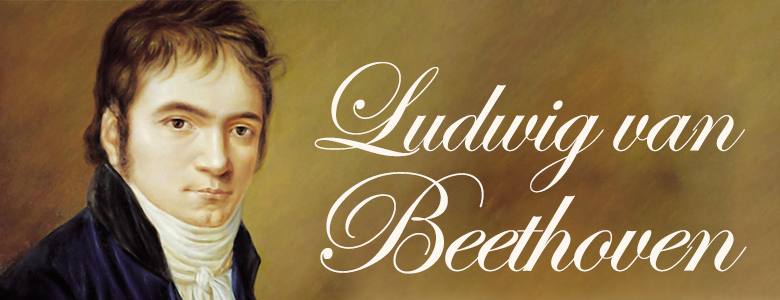
Celebrating Beethoven: Overcoming Adversity Through Art
by Matthew Ogden, December 2020
The month of December marks the 250th anniversary of the birth of Ludwig van Beethoven. Great concerts and celebrations of this composer’s music had been scheduled around the world, but due to the global pandemic, these concerts have been postponed indefinitely. Instead of the sublime music of Beethoven filling concert stages and symphony halls across the globe, all we hear is silence instead.
But perhaps this is an apt metaphor which could allow us to understand and appreciate Beethoven the composer even better. There is a certain poetic irony to the fact that in the year 2020, as the world prepared to celebrate the momentous anniversary of this composer’s birth with grand and performances, we are being forced instead to share in Beethoven’s own personal affliction: a deep and deafening silence.
At the age of thirty, right at the point Beethoven was establishing himself as a composer in the musical city of Vienna, he noticed a marked decline in his ability to hear, writing in a letter to a friend:
“My ears are buzzing and ringing perpetually, day and night… In the theatre I am obliged to lean close up against the orchestra in order to understand the actors, and when a little way off I hear none of the high notes of instruments or singers… I often can scarcely hear a person if speaking low; I can distinguish the tones, but not the words… Heaven alone knows how it is to end!”
Ludwig van Beethoven, Letter to Franz Gerhard Wegeler, June 29, 1800
Beethoven had already suffered a substantial weakening in his hearing for several years, since his mid-twenties. By the time he reached his forties, he was almost completely deaf. For a composer or any musician, whose art is that of painting with sound, being cut off from the world of sound itself would be devastating. As Beethoven described it in a letter to his brothers:
“What a humiliation when one stood beside me and heard a flute in the distance and I heard nothing, or someone heard the shepherd singing and again I heard nothing, such incidents brought me to the verge of despair.”
Ludwig van Beethoven, Letter to Carl and Johann Beethoven, October 6, 1802
But despite this cruel turn of fate, Beethoven struggled through. He wrote: “I shall strive if possible to set Fate at defiance” and declared that it was only his dedication to his art that sustained him. A relentless sense of purpose drove him to carry on “in defiance of all the obstacles of Nature,” and he continued to compose, producing some of his greatest masterpieces during this time, all of which remain among the defining music of the age. Included among these are his late piano sonatas, his late string quartets, the Missa Solemnis, and the immortal Ninth Symphony, with its choral finale which begins with the baritone soloist declaring, perhaps somewhat ironically, “Oh friends, not these sounds!”, and then implores “But rather let us sing those more pleasing and more full of joy!” from which follows an exultant and triumphal hymn to joy, to human brotherhood, and to the Creator.
Helen Keller, who was rendered not only deaf but blind as well by a childhood disease, described in an extraordinary and beautiful letter to the New York Symphony Orchestra in 1924, an experience she had of “hearing” the music of Beethoven’s Ninth, when someone placed her hand on the diaphragm of a speaker, allowing her to feel the vibrations of sound:
“What was my amazement to discover that I could feel, not only the vibration, but also the impassioned rhythm, the throb and the urge of the music! The intertwined and intermingling vibrations from different instruments enchanted me… When the human voices leaped up thrilling from the surge of harmony, I recognized them instantly as voices more ecstatic, upcurving swift and flame-like, until my heart almost stood still… As I listened, with darkness and melody, shadow and sound filling all the room, I could not help remembering that the great composer who poured forth such a flood of sweetness into the world was deaf like myself. I marveled at the power of his quenchless spirit by which out of his pain he wrought such joy for others – and there I sat, feeling with my hand the magnificent symphony which broke like a sea upon the silent shores of his soul and mine.”
Helen Keller, Letter to the New York Symphony Orchestra, February 2, 1924
Despite Beethoven’s personal world of silence, his music has reverberated across generations, inspiring millions. As we experience the silence that the pandemic has brought, it gives us a moment to reflect on the silence which Beethoven himself suffered, and also share in his determination to defy despair and to continue to create and give his music to the world. As did Helen Keller, we marvel “at the power of his quenchless spirit by which out of his pain he wrought such joy for others.” May we always strive to do the same. Perhaps 2020 can be a year for us all to emerge from our common affliction that much stronger, just as Beethoven did, and rededicate ourselves to our art, and to the joy of others. And when the music can finally play again, may it be sweeter and more triumphant than ever!
